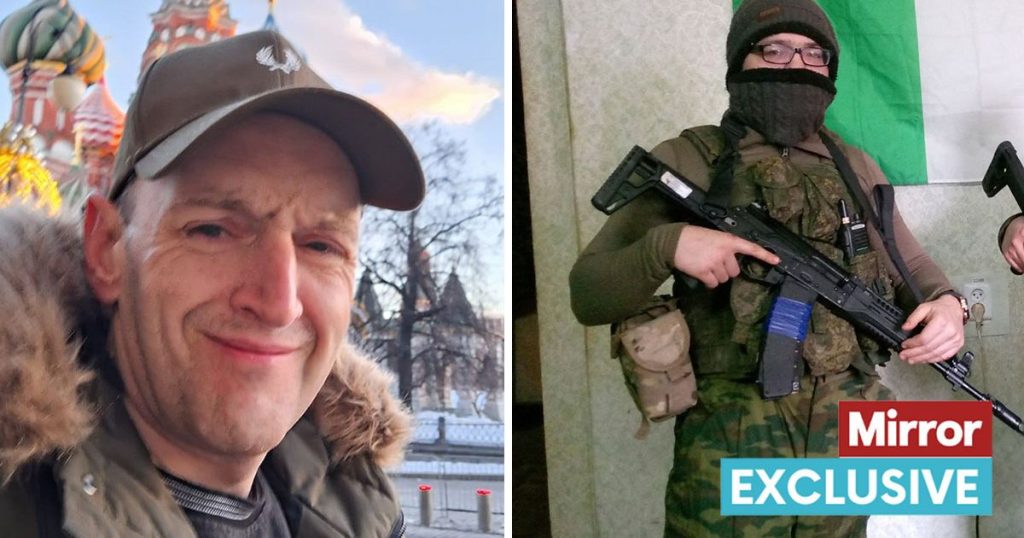Russian state media has identified Ben Stimson, 48, and Aiden Minnis, 37, as the first Brits fighting for Vladimir Putin in Ukraine, hailing them as heroes. Both men have criminal backgrounds and were highlighted by the Mirror, leading to a propaganda war orchestrated by the Kremlin to portray them in a positive light. Russian state media, including papers like Komsomolskaya Pravda, mocked the British reaction to the news, claiming they had caused hysteria. Ben Stimson boasted about his newfound celebrity status in Russia, stating that he had no intention of returning to the UK. The propaganda campaign sought to portray the Brits as supporters of pro-Russian fighters and challenge the perception of them as traitors.
The story of Ben Stimson and Aiden Minnis, the first Brits fighting for Putin, has generated a flurry of media attention both in the UK and Russia. Russian state-owned newspapers and online platforms celebrated Stimson and Minnis as heroes fighting for a just cause, with Kremlin propaganda emphasizing their support for Russia. The reaction to their identification in the UK has sparked a propaganda war between the two countries, with Russian media dismissing British concerns as hysteria. Stimson’s interviews with state-controlled Russian media outlets like RT and Sputnik have further fueled the propaganda campaign, portraying him as a warrior defending Russia from fascist forces in the UK. The manipulation of information to present Stimson and Minnis in a positive light highlights the power of propaganda in shaping public perceptions.
The propaganda war surrounding Stimson and Minnis has highlighted the role of state-controlled media in promoting political agendas and shaping public opinion. Russian media outlets have used the story of the two Brits fighting for Putin to boost patriotic sentiment and showcase the support for Russia among foreign fighters. The portrayal of Stimson and Minnis as heroes and defenders of Russia’s interests serves to strengthen the narrative of a unified front against external threats. By framing the Brits as supporters of pro-Russian fighters, the Kremlin seeks to undermine negative perceptions of its involvement in the conflict in Ukraine and portray itself as a champion of justice and freedom.
The case of Ben Stimson and Aiden Minnis fighting for Putin in Ukraine raises questions about the role of foreign fighters in conflicts and the influence of propaganda on public perception. The recruitment of individuals like Stimson and Minnis, with criminal backgrounds and troubled pasts, highlights the complex nature of conflicts and the recruitment tactics used by various parties. The manipulation of information by state-controlled media to paint a positive image of foreign fighters underscores the role of propaganda in shaping public opinion and influencing perceptions of geopolitical events. The ongoing propaganda war between Russia and the UK over the Brits’ involvement in the conflict in Ukraine sheds light on the power of media narratives in shaping political discourse and public attitudes towards war and conflict.
The saga of Ben Stimson and Aiden Minnis as the first Brits fighting for Putin serves as a cautionary tale about the dangers of propaganda and misinformation in shaping public perceptions of conflicts. The manipulation of information by state-controlled media outlets to present Stimson and Minnis as heroes fighting for a just cause illustrates the power of propaganda in influencing public opinion and shaping narratives of war and conflict. The propaganda war between Russia and the UK over the Brits’ involvement in the conflict in Ukraine highlights the role of media in shaping political discourse and influencing public attitudes towards foreign fighters and conflict zones. The case of Stimson and Minnis provides valuable insights into the complexities of modern warfare and the ways in which propaganda can be used to manipulate public opinion and perceptions of geopolitical events.


